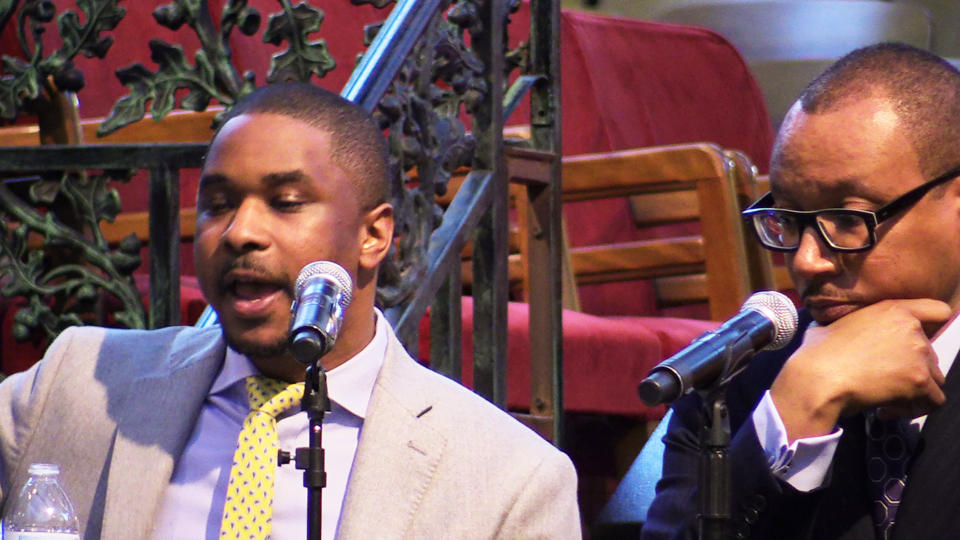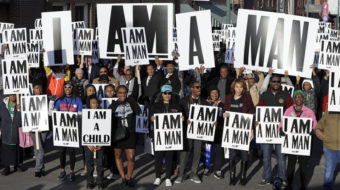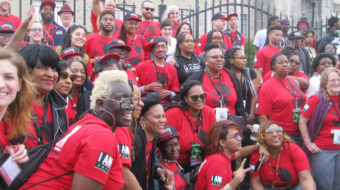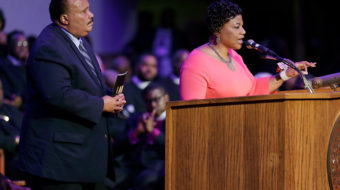
MEMPHIS, Tenn.—Increasingly emphasizing economic democracy, Dr. Martin Luther King Jr. was trending left as a social democrat, just before his assassination in Memphis, Tenn., 50 years ago, speakers at a commemorative conference said.
Panelists on April 2, in the first day of a three-day combination of conference, symposium and training for future action, also pointed out the civil rights leader was increasingly radical in the months before his murder, on everything from denouncing the Vietnam War to launching the Poor People’s Campaign.
And that cost him support, both white and black, said Harvard African-American Studies Professor Brandon Terry. And King didn’t make his social democratic beliefs public, another speaker said, because he knew doing so would endanger the civil rights cause.
That view of Dr. King and his relevance today was the topic of panels at “I Am A Man 2018” conference in Memphis. Speakers tackled King’s economics, which brought him there 50 years ago to support 1,300 sanitation workers forced to strike for union recognition with AFSCME, decent pay, better working conditions and respect on the job, among other aspects of his agenda. That union and the 6-million-member Memphis-based Church of God in Christ organized the conference.
The workers walked out in 1968 after two of them were killed while eating lunch in the back of their garbage truck, when its compactor started up. They were forced to eat there because, despite a rainstorm, segregated Memphis restaurants wouldn’t let them enter.
But the speakers discussed far more than King’s economics, even though the civil rights leader himself recognized, and said, that eliminating segregation’s legal props and barriers was only the “first civil rights revolution.” Economic security was the second, King said. It still is, the speakers added.
“His new phase was to end poverty and end economic unfairness,” Harvard African-American Studies Professor Tommie Shelby said. King “called for a civil rights-labor alliance, because blacks and labor have the same concerns.” Added panelist Kenneth Johnson: “It’s unlikely we’ll break the power of white supremacy without organized labor.”
Speakers cited various statistics showing African-Americans still lag behind the rest of the nation both in racial and class terms. And, just as occurred after King’s murder, African-American efforts to get ahead are again provoking a counterrevolution. In 1968, it was Richard Nixon’s Southern Strategy. Now, it’s “nationalism and racism and Donald Trump’s picture on the wall,” Terry added.
King’s solution to the classism and racism he saw was to take the economic battle north, other speakers said. He wasn’t always successful, particularly in Chicago and its white working-class suburb, Cicero. While speakers did not say so, there, in 1966, King and his supporters were targets of rocks, bottles, batons and hate. His family, living in a Chicago-area apartment, was threatened.
But while being a social democrat economically – in the 1960s sense of the term – speakers admitted King did not challenge the basic capitalist system. He advocated making labor “equal at the table” to capital and ensuring its right “ to take a good share” of the profits it produces, one speaker said. “He did emphasize the importance of building and strengthening labor organizations.” Instead, unions should be made strong enough “to increase concessions.”
He also “appealed to the democratic traditions of America” and to the “black social gospel tradition” of agitating for social and then economic justice, Columbia Professor Gary Dorrien said. The difference was King, unlike his father and his father’s generation of pastors, launched non-violent civil disobedience on a mass scale, in the nation’s streets.
King was doing that for economic justice when he was killed. “From 1960 until the end of his life, Dr. King got more radical every year,” Dorrien said. “But he used non-violence as a healing sword.”
Despite the hate King encountered and the hate his successors encounter today, speakers were optimistic systematic change can occur. They admitted, however, that it would take “positive social movements” and wide-ranging coalitions, including civil rights, labor, community and environmental groups. The change can happen through an array of economic and other changes they proposed, including:
• A de-emphasis on war spending. Speakers said that not only includes militarization overseas, such as the Indochina War that King denounced, but also demilitarization of the nation’s 17,000 police departments.
And it means holding police and prosecutors accountable, said Pastor Michael McBride of Berkeley, Calif. Prosecutors usually dismiss cases involving police shootings of unarmed civilians, added Brian Dunn, a partner in the Johnnie Cochran law firm of Los Angeles, during a panel on crime prevention and police abuse.
“One-tenth of 1 percent are prosecuted and many of those are acquitted,” Dunn explained. He also called for an end to cash bail, which frequently keeps African-Americans in jail for months or years even when they’re ultimately acquitted. “We have forgotten that police work for us, that prosecutors work for us,” said McBride.
Accountability would help not only African-Americans, but whites as well, who are also victims of police shootings of unarmed people. There are more police shootings of unarmed whites but a far higher proportion of police shootings of unarmed non-whites, Dunn pointed out. Most get little notice.
Dunn’s handled 200 cases of victims of police shootings in a 25-year-career. “And for every one you hear about, there are 100 that you don’t.”
“To kill a person, you must de-humanize a person first,” Carpenters Local 92 member James “Jay” Ozier, president of the St. Louis chapter of the Coalition of Black Trade Unionists, told Dunn. “Every other day, an unarmed black person is killed by a police officer. True?” he asked. “Yes,” Dunn replied.
Desensitization, he explained, often happens to people of color.
And when he meets with the grieving families, Dunn said, the question he hears over and over again is “Can you keep another family from going through this?”
• Redefine “public safety” beyond police, prosecutors and the criminal justice system. McBride said it must include “decent housing, enough food and safe places to play.”
• Construct a political platform “that can speak to those left behind” by the increased income inequality and power shift to the rich and corporations in U.S. society, as Warren put it.
That platform should include, he said, guaranteed jobs – notably public works jobs – for all, a minimum yearly income floor, single-payer government-run health care and paid family leave.
The one largely unaddressed change was how to change the hearts and minds of people – again the white working class and especially white working class men – who feel threatened by the demands for upward mobility and an equal shot at jobs, pensions, nice houses and prosperity, by people of color.
“Abstract rights, even if codified into law, still allow for second-class citizenship,” Shelby said. “White America never built a culture of atonement, as Germany did” in the 1950s, for Jewish survivors of the Nazi Holocaust, Warren added.
“I tell my generation ‘Yes, there’s hope,’” said panelist Deidra Rogers, a senior at the University of South Florida and close friend of the late Trayvon Martin, the first unarmed African-American man to be gunned down – in his case by a so-called Neighborhood Watch volunteer, not a police officer.
“But are we going to rant on Twitter, or are we going to go deeper, because there are mindsets that have to be changed?” she asked.
Instead, after King’s death, white America built up a myth about King that took hold and has eliminated the sharpened edges of his beliefs and goals, speakers said. “King himself played down the ‘dreamer’ aspect, as it didn’t comport with the black power movement, which he increasingly embraced,” Johnson stated. “He was scathing and specific about what was needed.”
Those needs are still there, in some cases even more so than in 1968, speakers said. Much of the conference’s remaining days — including strategizing about economics and politics and training new organizers — will be dedicated to restoring those edges Dr. King was enunciating before he was gunned down.












Comments